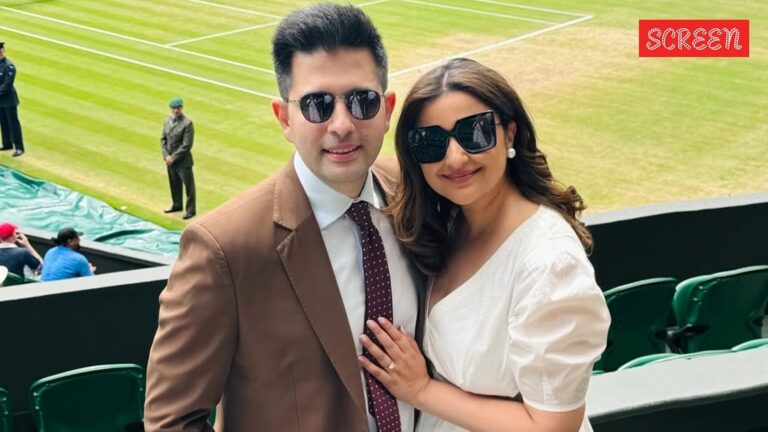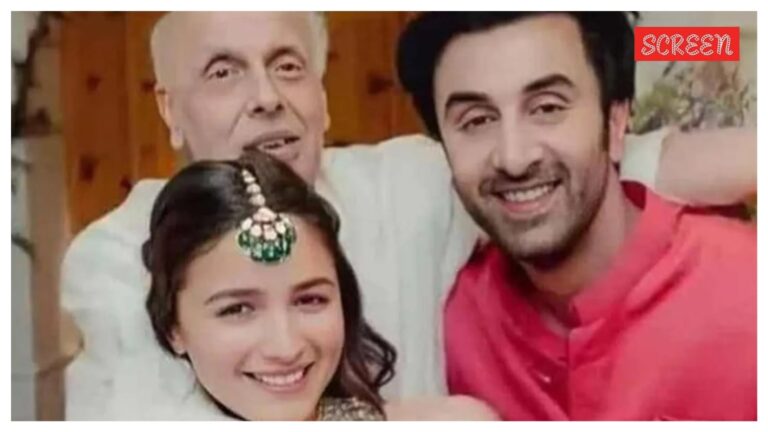In Sarzameen, a stern military man allows his only son to be murdered by terrorists in Kashmir because… nation comes first or something. You often hear about parents who proudly declare that they are willing to sacrifice their children for the country, and perhaps Prithviraj Sukumaran’s Vijay Menon is cut from the same cloth as those folks. The only difference is that his son isn’t a soldier on the front-lines, but a child for whom he feels no love. Played by Ibrahim Ali Khan, the child’s name is Harman, and the only reason his father hates him is that he isn’t like the other boys; he’s timid, he can’t play sports, and he speaks with a stutter.
Bizarrely enough, Sarzameen implies that Vijay wouldn’t have let his son die had he conformed to the ‘norms’ of boyhood. If Harman didn’t have a speech impediment, the movie suggests, he’d likely have lived. It’s an astounding thought that struck absolutely nobody in the Dharma writing incubator that coughed up this script, which relies almost exclusively on contrivance, convenience, and coincidence to keep the plot moving. Sarzameen expects us to root for a reunion of some kind after it reveals that Harman miraculously survived a bullet to the head — nobody dies in this movie, even after being shot at point-blank range — but unintentionally gets us to cheer for a terrorist to kill a member of the Indian Army.

Only a complete failure in storytelling can send a viewer so wildly off track. Sarzameen is directed by Kayoze Irani, who showed such promise with his heartfelt short film in Ajeeb Daastaans. For him to have selected this as his feature debut makes no sense; as it is, it feels like he wasn’t involved in the conceptualisation and execution of the action scenes at all. His focus, presumably, was on the drama. And it’s drama straight out of a poor ’90s movie; you can imagine how competent Sarzameen is when you realise that even Netflix, which gave an enthusiastic thumbs-up to Nadaaniyan, drew the line.
As with that film, it feels like every line of dialogue here has been dubbed in a booth and not performed on set. Hindi isn’t Prithviraj’s mother tongue, and acting doesn’t come naturally to Ibrahim. He shows up only after the first act, when Harman inexplicably escapes from the clutches of his captors and reappears in his parents’ lives. For some reason, his mother, played by Kajol, is still married to Vijay, even after he abandoned Harman and left him to die. Had Sarzameen shown us what happened during those eight years, her decision would’ve made sense. But because it doesn’t, you’re left to assume that the only reason she stuck around is because she has a job to fulfil in the film’s third act.
Unlike Brody from Homeland, who was closely monitored by the CIA after he returned from captivity tried to begin his life afresh, Harman is simply allowed to go home to his parents. They barely recognise him. He no longer has a stutter, and he seems more confident than he used to be. Vijay is convinced that he’s an imposter — the fact that he believes Harman would be the same person who ‘died’ eight years ago is bananas. Vijay knows that Harman was living with terrorists; he knows that Harman was probably tortured and brainwashed. And still, he welcomes Harman into his house without having him cleared first. Sarzameen seems to think that the dramatic conflict of these scenes rests in whether Harman is Vijay’s son, and not whether he’s a terrorist.
The more suspicious Vijay becomes of Harman, the more you want to lean in and remind him that it’s all his fault. Consequently, you root for the kid to shoot him in the face. This almost happens in the pre-interval scene, by the way. But the scene ends with a twist so wild that its sole purpose, seemingly, is to disarm you for the further insanity that Sarzameen has prepared for the climax. Let’s talk about it. It is revealed that Harman was, indeed, a militant brainwashed against his father, who, it wouldn’t be a stretch to assume, is the living manifestation of India. The villains didn’t have to work too hard; Vijay did have him murdered, after all. The movie would’ve been far more complex had Harman come from a loving home, or if it had shown Harman commit a terrible crime before resurrecting himself. It’s almost as if the most interesting chunk of the story — the eight years that Harman spent away from home — was deliberately edited out.
Story continues below this ad
Read more – Ae Watan Mere Watan: Heartbreaking, the worst film you’ve seen just made some strong political points

Vijay, of course, has an awakening. But nothing can redeem him; he’s like the dad from Udaan, but if he was also a child-killer. The real twist — and Abbas Mustan would be so proud of Kayoze — is that Kajol’s character was a double agent all along. It’s like they’re gifting the Saiyaara generation with their own version of Gupt: The Hidden Truth. She was sent to spy on the Indian Army, but she fell for Vijay and had a child with him. Why she fell in love with a man like him isn’t something that the movie feels confident enough to explain. And, having seen what sort of guy he is, it’s impossible for the viewer to fill in the blanks either.
Sarzameen is, after all, a movie that paints an Army officer as the villain and projects militants as morally justified in their actions. So, why can’t it be appreciated like the scores of films made about America’s war crimes after 9/11? Why does Sarzameen have more in common with Kajol’s own Fanaa — the film’s Harry Potter connections deserve a separate article — than it does with something like The Forever Prisoner, a film that understands the difference between empathising with a wrongdoer and actively cheering them on. By relying on trivial tropes, the movie does a disservice not only to its own characters, but also a very real geopolitical issue.


























